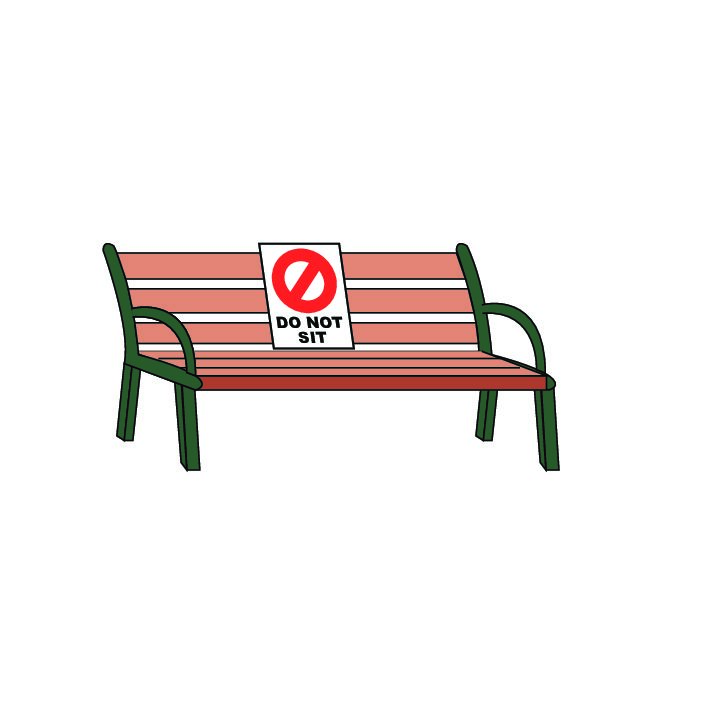In downtown Orlando, many benches that line the sidewalks have statues obstructing the seat. The sole purpose of a bench is for sitting, so why did the city planners commission such pointless structures?
Defensive urban design, also known as hostile architecture, is a form of city planning that restricts behavior and targets those who use public spaces the most, such as the homeless. Hostile architecture can be seen all around us: boulders along sidewalks, spikes under bridges and even statues or bars obstructing benches are all considered hostile architecture. The purpose of these structures is to discourage “undesirable” members of the public from residing in public spaces.
Tactics like this are common in highly populated cities such as Orlando. In a 2019 survey, the National Homeless Law Center found that in the United States, anti-homeless laws such as prohibiting loitering and/or vagrancy had increased by 103% since 2006. These policies can be seen frequently in Florida, since our state has the third largest homeless population in the country.
According to NBC News, officials in West Palm Beach created a sound blockade to prevent homeless people from sleeping around the Lake Pavilion Patio. Songs generally considered repetitive and annoying, such as ‘Baby Shark’ and ‘Raining Tacos’ were played on repeat in order to keep the homeless population from sleeping there.
Anti-homeless legislature has also begun to target groups who help the homeless. In 2006, Orlando Mayor Buddy Dyer supported the ordinance which made distribution of food to more than 24 people in public parks illegal. Members of organizations attempting to feed the homeless were arrested repeatedly for their efforts. It seems you’re allowed to feed ducks at the park, but not other people.
In June, Texas Governor Greg Abott signed a statewide ban for taking up residency or storing personal belongings in public spaces, punishing violators with up to $500 in fines. This law tells the homeless population that they’re not welcome to exist in the only spaces they have to do so. This also begs the question, if public property is not meant to be used by the public, then who is it meant for?
“In my opinion, the justification for this type of stuff is misguided,” social science teacher Brandon Burmeister said. “You’re looking at people who don’t like the look of having homeless people in their cities so they’re trying to move them out rather than looking at what is the root cause.”
Anti-homeless policies are used to systematically drive out the homeless so the city can avoid facing accountability for its underlying issues that lead to having large homeless populations in the first place.
One cause of homelessness is that our government continually fails to support its most vulnerable populations. Veterans returning from war, non-white people, people struggling with mental illnesses, the LGBTQ population and those struggling with addiction are the most likely people to suffer homelessness.
According to Forbes, 39.8% of homeless individuals are African-American, despite only making up 13% of the overall US population.In a study conducted by Street Kids, 40% of homeless kids identified as LGBT. Substance Abuse and Mental Health Services Administration stated that 20% to 25% of the homeless population suffers from severe mental illness. The National Coalition for the Homeless found that 38% of homeless individuals have substance abuse issues. Homelessness isn’t random, and it can be prevented by funding programs to protect populations subject to losing their homes.
“There’s stigmas around things like alcoholism and mental illness, and we have to get over that and start really taking those issues seriously if we want to solve those problems,” Burmeister said.
Another leading cause of homelessness is the difference between our minimum wage and what would be considered a livable wage. Housing costs are rising at a much higher rate than wages, making it extremely difficult for many to afford housing. A report by the National Low Income Housing Coalition states that an Orlando area worker earning minimum wage would need to work 117 hours a week in order to afford the average rent.
“Affordable housing is not only a necessity but it’s also a boon for developing your economy,” Burmeister said.
Homelessness will continue to exist for as long as we view housing as a commodity rather than a necessity and criminalizing the homeless population does nothing to solve this problem. In what world would the solution to homelessness be putting bars on benches?










